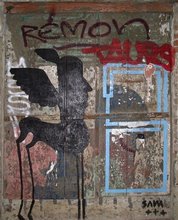Simon During covers a lot of territory in his critical introduction to cultural studies, and we’ll need to make some choices about what we’re going to cover. I’m certainly open to your own suggestions, so please feel free to use the comments feature here to pose questions or issues you’d like to see us cover. Following are some basic topics I think we should discuss.
1. How does “culture” emerge as an object of study in the opening chapters of his book, and how does it compare to the definitions we discussed last time? How does During himself define “culture,” and are there problems you see with his definition? See in particular the opening discussion of “culture today” on pp 6-7, and the concept of “enterprise culture” he sketches out on pp. 14-17. See also the link between culture and “everyday life” discussed on pp. 28-29. It might make sense to consider the section on “Time” in the context of discussing how culture gets conceptualized in the book. See in particular his discussion of the “contemporary” as a concept and the treatment of postmodernism that follows (pp. 61-68). To what extent does the concept of “culture” in the book get connected to the contemporary and the postmodern? How does the whole idea that the practice of cultural studies is characterized by “engagement” (p. 1) and that cultural studies is inherently political (38-43) impact the way we conceptualize culture as an object of knowledge? See in particular the issue raised on p. 43 – if questions about class and capitalism dominate a politicized cultural studies practice, what happens to the analysis of identities?
2. The question of how culture is constituted as an object of knowledge is closely related to its status as a field of study and its relationship to disciplinarity. During devotes a good bit of space to this topic, raising some important issues we should discuss. Some questions to consider: What are the main disciplinary roots of cultural studies? Is cultural studies really linked as closely as During insists it is to literary studies (see pp. 30-31)? If cultural studies conceives of itself as a critical or even a subversive practice, then what relationship should it have to the traditional disciplines and the university structures they underwrite? See the discussion of this topic on pp. 10-11.
3. We should also discuss the debate about agency that emerges in these chapters. To put it bluntly, is culture a sphere of domination or liberation? This question gets raised in the section on everyday life (p. 29) and again on pp. 32 and 33 with regard to Althusser and postmarxism. How can we connect this debate to the essay on the culture industry by Horkheimer and Adorno?
4. Finally, During frames his whole discussion of contemporary cultural studies around an analysis of globalization and the insistence that culture is now a global affair. This is his opening point on pp. 5-7, and the whole section entitled “Space” is actually about globalization. Some questions we’ll want to explore: How does During define globalization (see especially 83-5). What does he mean by “vernacular globalization” and “popular cosmopolitanism,” sketched out on p. 86-7? We’ll certainly want to conclude by discussing his treatment of globalization and culture on pp. 92-5.
Throughout our discussion we should try to ask ourselves where the study of networked public culture fits into the frameworks he introduces. Does he pay attention to this aspect of culture, or does it seem like something that emerges after the book is written? This is something we'll pick up with next week in his section on "Media Studies" with its subsection on the internet and "technoculture."
Subscribe to:
Post Comments (Atom)

No comments:
Post a Comment